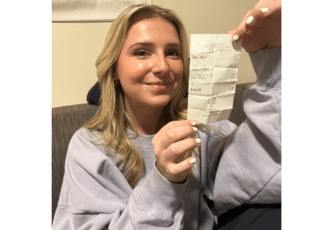
Move over mixers and formals, turns out one of the main benefits to Greek life is a higher GPA.
Affiliated Pepperdine students find that being involved in a sorority or fraternity helps them maintain an active social life and aids their academic success. A Pepp Post poll of 50 affiliated students found that the majority of Greek organizations have a GPA requirement, enforce weekly study hours, provide members with academic mentors and reward members for their academic achievements.
“Greek life in the structure, they have networks built into their organizations to promote academics,” said Doug Hurley, director of Student Activities and Campus Recreation. “They have mentors that are asking you how you’re doing with your grades, they have study halls, they have prizes for students who earn higher grades, etc. So they have that built into the fabric of who they are as we’re all about academics.”
Hurley said about 33 percent of Seaver College students are currently involved in Greek life. Most students said the Greek GPA standards keep students on track academically even as Greek life adds extra time pressure.
GPA qualifications
The poll found that the average GPA for affiliated students was 3.5. The lowest GPA was a 2.5 and the highest was a 4.0.
To join any Pepperdine sorority or fraternity, a student must maintain a GPA of 2.5 or higher, according to Pepperdine’s Greek Life Seaver webpage.
“Before recruitment you have to submit an application, and in that application you have to put in, if you’re a freshman, all of your high school grades and any academic honor societies you were in, and if you’re a transfer, you have to put in your GPA from your former school,” said Mary Mattingly, a senior public relations major and former president of Kappa Kappa Gamma. “So that’s the first thing we look at and if they don’t meet a specific requirement, then we don’t even take you into the sorority, or when they don’t meet the GPA requirement.”
Lena Fucile, senior economics major and Alpha Phi head of recruitment, agreed.
“If you’re under a 2.5 GPA you cannot be active,” Fucile said. “It’s a 3.3 to hold a position. To be on executive, it has to be higher.”
Affiliated Pepperdine students think that the university offers a respectable balance between academics and Greek life in order for students to maintain their GPA.
“If you’re going to dedicate yourself to a philanthropy, or to your sister, or to the betterments of your chapter, Pepperdine should promote your academic performance because you don’t want a social event to get in between your grades and your social life,” said Sophie Nelson, a first-year double major in political science and international studies and a Delta Delta Delta pledge. “I don’t think if I was at a different school other than Pepperdine, I would have rushed. It’s specifically because the Greek life here doesn’t take up your entire life, it’s not your only identity which is really nice.”
Nick Angelo, first-year film studies major and Sigma Phi Epsilon pledge, said his fraternity has a set of standards they look for during the recruitment process, and doing well academically is the first on the list.
“We are looking for guys with “sound mind” meaning they do good on their work, “sound spirit” where they have a good healthy relationship with God and “sound body” is where they take care of their body and workout,” Angelo said.
Supporting academics
The poll found that 52 percent of affiliated students at Pepperdine do not feel like their sororities or fraternities get in the way of their academics.
Tommy Lasorda, a first-year business major and Sigma Chi pledge, said his fraternity stresses academics because it’s a part of the many expectations of what they call the “Jordan Standard” of what a man should be to gain acceptance into the Pepperdine fraternity.
The “Jordan Standard” is a national template of standards that all men recruited into the Sigma Chi Fraternity should adhere to, according to the official Sigma Chi Fraternity webpage.
“We even have a position in our fraternity for somebody that manages and watches our grades,” Lasorda said. “We can go to that person if we need any help and they can offer assistance to us and also give reminders for us to do good in school.”
Luke Harrell, first-year sports medicine major and a Alpha Tau Omega pledge, said he was eager to pledge to his specific fraternity because of their work ethic.
“Lots of people I liked, that came out to pledge, are people that I studied with earlier in the school year,” Harrell said. “Guys in my fraternity that I know take school seriously and are grade driven in order to find a good career. I think our GPA is higher than most.”
Sororities at Pepperdine were eager to brag about how they promote academics.
Other affiliated students said their sorority stresses the importance of study hours and proctoring for people struggling to reach or to maintain a certain GPA.
“I always have the support from my sorority sisters of you can do it, you can get through this test,” Nelson said.
Rosina Calandra, a first-year nutritional science major and Kappa Alpha Theta pledge, said her sorority restricts attendance at events if academic success is not being met.
“In order to go to formal we have to turn in these midterm check-in sheets,” Calandra said. “We have to go to each one of our professors just to ask what our current grade is in the class and if we’re not passing we can’t go to formal.”
The poll found that 48 percent of affiliated students average 10 hours or more a week on homework and academics outside of the classroom.
If an affiliated Pepperdine student begins to fall behind GPA wise, sororities and fraternities among campus are supportive and eager to provide Greek life students with resources to rise back up academically.
Kayla Smith, a sophomore undecided major and head of the marketing team for Alpha Phi, said her sorority is pushing for academic success by offering rewards.
“We do this thing called “Academic Cookie of the Week” and you get a cookie if you do really well on a test and they will show you in chapters and put a picture of you and explain what you did for this academic achievement,” Smith said.
Greek life officials take matters into their own hands if academic standards aren’t met.
“What we find a lot of times is that when girls are falling behind with their academics it’s because another part of their life that they’re struggling with,” Mattingly said. “If she continues to fall behind, or isn’t using the resources we provided for her, then we actually have a thing called academic probation. Some things are going to get taken away, certain benefits, it’s pretty much just for them to get back on track in a more strict way.”
Abby Lapine, first-year political science major and vice president of public relations for Gamma Phi Beta, said her sorority puts an emphasis on academics as learning is one of their core values.
“If you don’t meet a 3.0, we have a whole system in place for study hours and we have a proctor,” Lapine said. “You get an individualized plan to meet with professors and go to office hours a certain amount of hours a week.”
The downfalls
Although affiliated Pepperdine students are achieving academic excellence, the pressures do still linger.
The poll asked affiliated students if they ever feel like Greek life is a distraction from class. Some 20 percent said yes, 44 percent said sometimes and 36 percent of students believe that Greek life does not distract them in class.
“Some students can’t handle the decision between grades or Greek life. There is no doubt about that,” Hurley said. “As a leader of maybe 30 maybe 50 of your peers and to keep everybody on the same page, I often heard from student leaders that it’s quite a challenge. They have to balance their academics, and sometimes they have a job or working at the volunteer center.”
Affiliated Pepperdine students said the pledging process is most time consuming.
“Professors are going to push back on that because they see students tired, distracted, busy,” Hurley said. “And that is true during recruitment, that is a hard period for them.”
Affiliated students also recommended that Pepperdine Greek life should do more to encourage academic success both in an out of the classroom.
“I feel like sororities or fraternities should make a competition between each other and see who has the highest GPA, which would be really cool,” Smith said. “Maybe Pepperdine Panhellenic can start making those events. That would motivate girls and guys to do better.”
Academic fraternities
Kari Okubo, senior integrated marketing communication major and a Delta Sigma Pi executive board and committee member, said being a member of a business fraternity has allowed her to strive even greater for academic excellence.
“Just surrounding myself in that environment kind of pushed me to to prioritize my academics because in the real world, they do care about what you’re learning and they do care about what you’re doing in the classroom,” Okubo said. “That will transfer what you’re going to do everyday for the rest of your life.”
In addition, Okubo now has connections outside of Pepperdine because of her Greek life interactions.
“In terms of the career, we have an alumni of over 200,000 across the world, and so being apart of the fraternity, I have received numerous internship offers from our alumni and our chapter, also in other chapters as well,” Okubo said.
Mattingly agreed and said alumni play a vital role in Kappa Kappa Gamma’s academic role at Pepperdine.
“Every semester we have something called an academic tea,” Mattingly said. “It’s a really fun afternoon tea on Sundays we do once a semester, and we have Kappa alumni or professors at Pepperdine or any women with leadership and a lot of academic excellence in the past. They come speak on a panel for all of the chapter.”
Myria Turbow completed the reporting for this story under the supervision of Dr. Christina Littlefield and Dr. Theresa de los Santos in Jour 241 in spring 2018. Dr. Littlefield supervised the web story.



